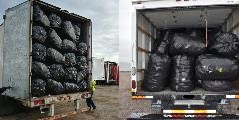Office of Public Affairs
For Immediate Release: January 22, 2019
News Release #2019-03
Media Contact: Lance Klug
Drivers Attempt to Smuggle Empty Beverage Containers from Arizona and Nevada
SACRAMENTO–The California Department of Resources Recycling and Recovery is announcing the arrests of two drivers on charges of felony recycling fraud, attempted grand theft, and conspiracy following stings at temporary border checkpoints in Riverside and San Bernardino counties. The suspects are accused of trying to smuggle more than 8,000 pounds of empty beverage containers from Arizona and Nevada into California in an attempt to defraud the California Redemption Value fund.

CDOJ photos of evidence from December 2018 recycling fraud border checkpoint busts in Blythe, Calif. (left) and Needles, Calif.
“Those looking to make fraudulent CRV redemptions on out-of-state containers soon learn CalRecycle and its partners at the California Department of Justice and the California Department of Food and Agriculture are on the lookout for these illegal loads,” CalRecycle Director Scott Smithline said. “Fighting fraud is a top priority for CalRecycle, and we use all available resources to succeed.”
From Dec. 3 through Dec. 5, 2018, CalRecycle joined CDOJ Recycling Fraud Team agents and CDFA partners to set up two temporary border checkpoints in Blythe, Calif., and Needles, Calif., to combat illegal smuggling operations.
- Semi-truck driver Hiran Rayon, 60, of Los Angeles was arrested at the Blythe checkpoint. He is accused of trying to smuggle 4,530 pounds of aluminum and 2,592 pounds of plastic empty beverage containers from Arizona to California to defraud the CRV fund of more than $10,500.
- Box-truck driver Jose Perez, 46, of Las Vegas, Nev., was arrested at the Needles checkpoint. He is accused of trying to smuggle 488 pounds of aluminum and 644 pounds of plastic empty beverage containers from Nevada to California to defraud the CRV fund of more than $1,600.
Upon conviction, felony recycling fraud and related crimes carry a potential sentence of six months to three years behind bars in addition to fines, court-ordered restitution, and possible loss of license and/or vehicle.
At a Glance: CalRecycle’s Recycling Fraud Prevention Measures
California’s Beverage Container Recycling and Litter Reduction Act incentivizes recycling through a California Redemption Value (CRV) fee paid by California consumers at the time of purchase and refunded upon return of the empty beverage containers to CalRecycle-certified recycling centers. Because the fee is not paid on beverages purchased outside the state, those containers are not eligible for CRV redemption.
In addition to CalRecycle’s interagency agreements with CDOJ and CDFA, CalRecycle aggressively combats fraud and illicit payments through enhanced precertification training of recycling center owners; probationary reviews of recycling centers; oversight of certified processors; monitoring and tracking of imported materials; risk assessment of daily claims for reimbursement; daily load limits; application of prepayment controls; and post-payment reviews and investigations.
For more information contact, the Office of Public Affairs, opa@calrecycle.ca.gov

Home Page | News Releases | Public Meetings | Broadcasts | Videos | Publications | Climate Investments | Organics | Bottles and Cans
CalRecycle provides oversight of California solid waste handling and recycling programs to protect human health, develop sustainable solutions that conserve resources, and reduce greenhouse gases that contribute to climate change.

